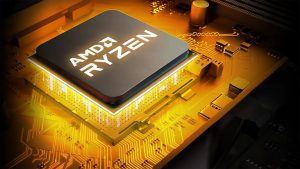AMD may use Samsung’s 4nm node for Chromebook processors

The cooperation between AMD and GlobalFoundries, and later mainly TSMC, has lasted for over a decade. It now seems that AMD may be looking to expand its reach and utilize Samsung’s 4LPP process in the creation of new Chromebook processors. These new 4nm nodes are likely to end up in AMD’s entry-level APUs, which are optimized for long battery life at minimal power requirements.
“Our research indicates that AMD is likely to outsource a Chromebook CPU to Samsung on its 4nm (likely mass production in late 2022), and TSMC may have limited capacity to allocate for Chromebook projects, given the declining market demand,” said Hariharan in a note.
If AMD does indeed proceed with working with Samsung, some of its products will be changed compared to the chips manufactured at TSMC. It’s possible that AMD may have to redesign its CPU and GPU IP in order to adapt it to Samsung’s 4LPP 4nm-class node process. Although this could prove to be rather costly, branching out is never a bad idea, and the 4nm process node seems well-suited for the low power requirements of Chromebooks.

The analysts at J.P. Morgan also believe that AMD may use the Samsung Foundry for some of its graphics card designs going forward, but this won’t happen until much later. The report predicts 2023/2024 as the time when AMD may work with Samsung 3nm on some GPU-related projects. Although AMD is definitely branching out, the analysts predict that the vast majority of its core platforms will remain with TSMC N3.
The information comes from a note prepared for the clients of J.P. Morgan that was then shared on Twitter by @MarcTheShark83. We’re not likely to see the new AMD APU anytime soon — production is set to begin in 2022. AMD is also working on new APUs from the AMD Rembrandt 6000-series, which when released will offer unprecedented iGPU performance for this price range.
AMD is not the first manufacturer looking to switch things up. Recent rumors suggest that Apple may soon change its new M1 Pro and M1 Max chips. Found inside the new MacBook Pros, these chips are currently based on a 5nm manufacturing process, and it’s impossible to deny that they deliver top-notch performance. However, Apple might be about to switch to a 3nm process in order to achieve even better output. These chips would be created in cooperation with TSMC.

